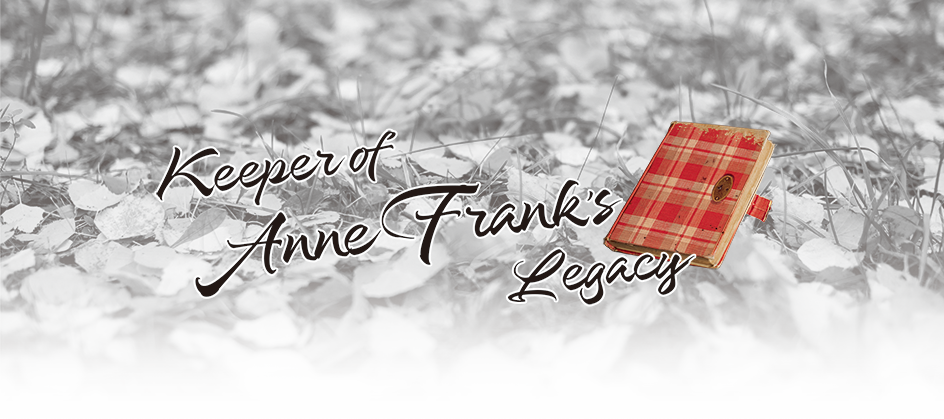

I see the world being slowly transformed into a wilderness, I hear the approaching thunder that, one day, will destroy us too. I feel the suffering of millions. … In the meantime, I must hold on to my ideals. Perhaps the day will come when I’ll be able to realise them!
—Anne Frank’s diary, 15 July 1944
On 4 August 1944, a squad of Gestapo agents swooped on the annex of the business premises at 263 Prinsengracht, Amsterdam. The eight people who had been seeking refuge there for 25 months—Otto Frank, his wife and two daughters, together with four other Jews—were arrested and later herded into the last transport to Auschwitz. During the raid, the police looted everything of monetary value, but something priceless was left behind: 15-year-old Anne Frank’s diary and her other writings.
Miep Gies, one of Otto’s employees who risked their lives to help the families hide, gathered up what she recognised as Anne’s papers and stowed them in a desk drawer, awaiting the girl’s return. But Anne never came back. Of the eight occupants in the secret annex, only Otto Frank survived. When he returned, Gies handed all the papers to him, saying, “This is the legacy of your daughter Anne.”
Devastated by the senseless deaths of his loved ones, Otto confided to his mother that “life does not have meaning any more”. But he had a change of heart when he finally brought himself to read Anne’s diary. He discovered a different Anne in the pages, one who was remarkably insightful and preternaturally gifted at writing. He found purpose again and wished to help promote reconciliation and human rights by sharing his daughter’s work with the world.
You’ve known for a long time that my greatest wish is to be a journalist, and later on, a famous writer. We’ll have to wait and see if these grand illusions (or delusions!) will ever come true, but up to now I’ve had no lack of topics. In any case, after the war I’d like to publish a book called The Secret Annex. It remains to be seen whether I’ll succeed, but my diary can serve as the basis.
—Anne Frank’s diary, 11 May 1944
Anne began keeping a diary in June 1942. Over the following two years, she wrote with searing candour about her thoughts, feelings, and the minutiae of a life spent in hiding. After hearing a radio broadcast that appealed to Dutch people to preserve war documents, she started to revise her diary in the hope that it might be published after the war. Otto selected, edited and combined entries from both the original and rewritten versions of the diary and some of her short stories to compile the most common version in circulation nowadays.
Today, Anne Frank’s diary is one of the most widely read books in the world, having sold over 30 million copies in 70 languages. Yet, 77 years ago, Otto faced an uphill battle to have it published.
The war had just ended; the wound was still too fresh and the memories way too painful. Publishers were reluctant to release a book that would remind readers of their suffering. Eventually, though, an Amsterdam publisher was willing to take a chance. In June 1947, Anne Frank’s diary was published in Dutch under her chosen title, The Secret Annex, in a small print run of 3,036 copies.
Publication in the United States was not easy either. As in Europe, Anne Frank’s diary was initially rejected by nearly every prominent publishing house. Judith Jones, a young reader at Doubleday, stumbled upon the diary’s French edition in a pile of discarded manuscripts and saved it from oblivion. In 1952, on what would have been Anne Frank’s 23rd birthday, her diary was published under the title Anne Frank: The Diary of a Young Girl in the United States with a cautious start of 5,000 copies. When a rapturous review by Meyer Levin was published in The New York Times Book Review, the diary quickly became a nationwide sensation and has since spawned a slew of adaptations—including plays, films and graphic novels.
I don’t want to have lived in vain like most people. I want to be useful or bring enjoyment to all people, even those I’ve never met. I want to go on living even after my death!
—Anne Frank’s diary, 5 April 1944
Apart from shepherding Anne’s diary to publication, Otto honoured and guarded his daughter’s legacy in every way he could. He helped preserve the house where his family had hidden, and waged legal battles against neo-Nazis and Holocaust deniers who challenged the diary’s authenticity. He also used proceeds of the diary for charitable causes and spoke about the atrocities of the Holocaust and his daughter’s message in public appearances and interviews. Until his death in 1980, Otto continued to correspond with readers who had been moved by his daughter’s diary. He often ended his letters with an exhortation: “I hope that Anne’s book will impact the rest of your life so that insofar as it is possible in your own circumstances, you will work for unity and peace.”
Anne Frank’s life, though short, was not in vain. Even in the darkest hour of mankind, she received unwavering love and care from her father, who strove to provide the best for her—bringing along her entire postcard and movie-star collection to the hiding place, tucking her in and saying prayers with her every night, composing poems for her birthday, staying beside her sickbed for hours and telling her stories after a hard day’s labour at the Westerbork transit camp. When she was denied the chance to live and become a writer, her father took it upon himself to fulfil that dream. Thanks to him, Anne’s diary has won a special place in the annals of literature and will continue to inspire readers for generations to come. Her wish to go on living even after death has come true.










